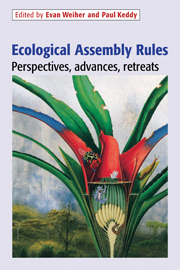Book contents
- Frontmatter
- Contents
- List of Contributors
- Introduction: The scope and goals of research on assembly rules
- Part I The search for meaningful patterns in species assemblages
- Part II Other perspectives on community assembly
- 8 On the nature of the assembly trajectory
- 9 Assembly rules as general constraints on community composition
- 10 A species-based, hierarchical model of island biogeography
- 11 Interaction of physical and biological processes in the assembly of stream fish communities
- 12 Functional implications of trait–environment linkages in plant communities
- 13 When does restoration succeed?
- 14 Epilogue: From global exploration to community assembly
- Index
12 - Functional implications of trait–environment linkages in plant communities
Published online by Cambridge University Press: 04 September 2009
- Frontmatter
- Contents
- List of Contributors
- Introduction: The scope and goals of research on assembly rules
- Part I The search for meaningful patterns in species assemblages
- Part II Other perspectives on community assembly
- 8 On the nature of the assembly trajectory
- 9 Assembly rules as general constraints on community composition
- 10 A species-based, hierarchical model of island biogeography
- 11 Interaction of physical and biological processes in the assembly of stream fish communities
- 12 Functional implications of trait–environment linkages in plant communities
- 13 When does restoration succeed?
- 14 Epilogue: From global exploration to community assembly
- Index
Summary
Introduction
In this chapter, three fundamental concepts in community ecology are dealt with: assembly rules, traitenvironment linkages, and plant functional types. Although all of them have received considerable attention in the literature, they have been rarely discussed in an integrated way. The detection of general rules underlying observed patterns has been a major aim of community ecology as it grows into an integrated, predictive science (Keddy, 1989; Drake, 1990; Barbault & Stearns, 1991; Grime, 1993). The interest in identifying consistent and predictable associations between plant traits, types of plants, and environmental conditions is an integral part of this search for generalization. These aspects have received renewed interest in the last few years. In the face of the challenges of massive loss of biodiversity and global climate change, accurate predictions are not anymore simply desirable for the sake of ‘good science’. They have become an urgent need.
This chapter is aimed at presenting an approach in which plant traits are used to construct functional types and to identify consistent traitenvironment linkages. On this basis, present fundamental community/ecosystem processes can be predicted, as well as their likely shifts under changing climatic conditions. Conceptual issues are first analyzed and empirical studies in the literature summarized concerning assembly rules (in a broad sense), traitenvironment linkages, and functional types. As an illustration of the approach, an example of the operation of environmental conditions as filters/assembly rules on a regional pool of plant traits along a steep climatic gradient is presented.
Information
- Type
- Chapter
- Information
- Ecological Assembly RulesPerspectives, Advances, Retreats, pp. 338 - 362Publisher: Cambridge University PressPrint publication year: 1999
Accessibility standard: Unknown
- 55
- Cited by
